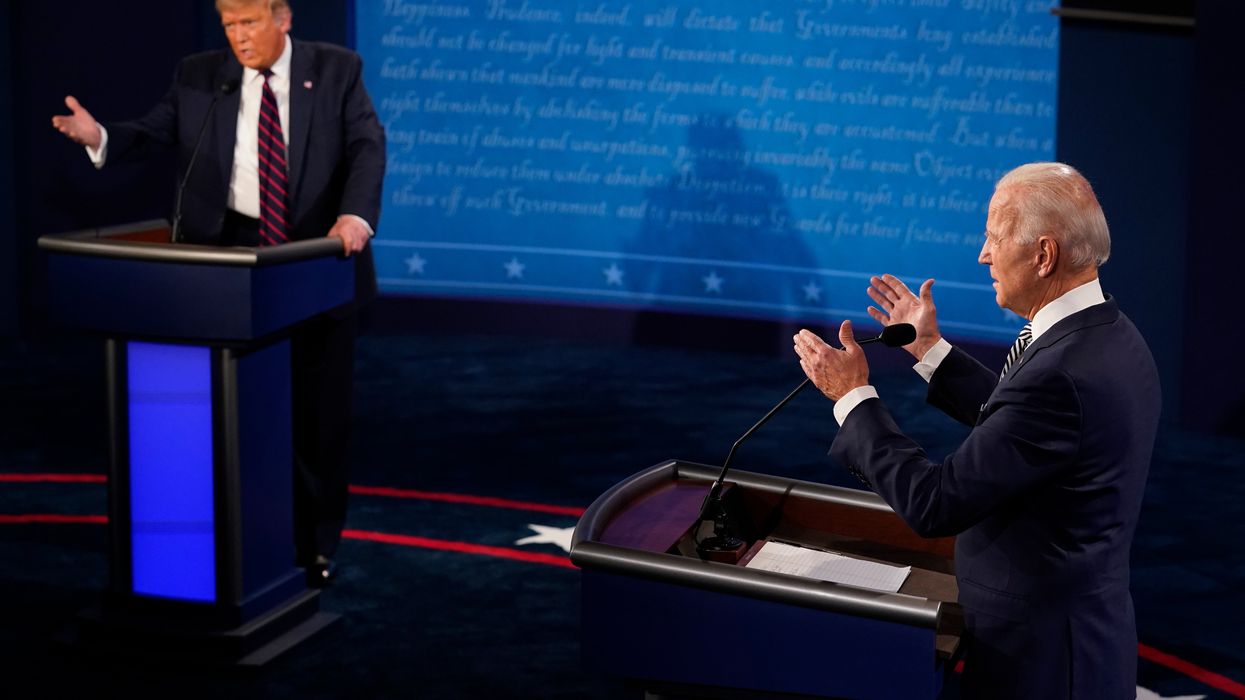Now it's a presidential debate that has created the latest low-point for our dysfunctional democracy — and on several fronts.
Tuesday night's chaotic 90 minutes of hectoring, crosstalk, bombast, browbeating, baseless assertions and buck-passing will be remembered, at a minimum, for effectively extinguishing the already sullied concept of civil political discourse.
It will also be known for President Trump finding yet another venerable democratic institution — somber debate of the top issues by the nation's two would-be leaders — that he was eager to attack. He employed so much off-point heckling and demeaning personal attacks that his exasperated challenger, former Vice President Joe Biden, twice labeled Trump a "clown."
And that was all before the sitting American president decided to intensify his unprecedented assault on the integrity of the coming presidential election itself and his unwillingness to promise a peaceful transition, unheard-of rattling of democracy's bedrock before a global audience that included an estimated 73 million American voters.
"Having a repeat of last night's debate risks muddying the waters on what should be quintessential democratic values, and foreign adversaries could try and amplify such rhetoric in an effort to sow further confusion and chaos ahead," David Levine of the Alliance for Securing Democracy, a bipartisan group formed to prevent a repeat of Russian interference in the presidential election, warned Wednesday.
"The U.S. election crisis moved to Code Red" because of the debate, said Josh Silver, founder of the prominent democracy reform group RepresentUs. "This is unprecedented in American history. If you're not worried about a coup d'etat by this president, you're not paying attention."
The Commission on Presidential Debates promised Wednesday that it would soon tighten the rules for the next two debates "to ensure a more orderly discussion."
Biden's "Will you shut up, man?" demand may be remembered as the clarion soundbite of the shambolic previous night, one when Trump's bullying and bluster amplified the notion that the presidency itself has become so demeaned as to further weaken democracy.
That was reinforced in the final substantive exchange. Trump unspooled a scattershot set of grossly exaggerated or essentially fabricated examples of election cheating to cast fresh doubt on the validity of the vote. He asserted wrongly that several states had extended the time for voting, when what they have done is extend deadlines for the arrival of absentee votes postmarked by Election Day. He refused, for the third time in a week, to promise to be part of an orderly transfer of power if he loses. And he declined, when asked by moderator Chris Wallace of Fox News, to pledge to not "engage in any civil unrest" or "not declare victory" until the count was complete.
As he has for months, Trump asserted without genuine evidence that the record use of mail-in ballots, thousands of which have already been completed, would assure "this is going to be a fraud like you've never seen."
"They're being sold. They're being dumped in rivers. This is a horrible thing for our country. This is not going to end well," he declared.
Trump also said he was likely to insist that the Supreme Court be the ultimate referee in disputes over absentee ballots — which could mean a delay of weeks if not months in the final outcome. It also has Senate Democrats intensifying their campaign to persuade Trump's nominee, Judge Amy Coney Barrett, to recuse herself from any election cases if confirmed in time.
"I think I'm counting on them to look at the ballots, definitely." Trump said of the justices. "I hope we don't need them, in terms of the election itself. But for the ballots, I think so, because what's happening is incredible."
Biden, for his part, was unequivocal in committing to accepting the final results of the election regardless of the outcome — also saying unequivocally that he views voting by mail as trustworthy and noting the president's own casting of Florida absentee ballots from the White House. He said Trump's smears against absentee ballots — at a time when tens of millions will use them for the first time to avoid coronavirus exposure — are part of his effort to suppress turnout.
"This is all about trying to dissuade people from voting because he's trying to scare people into thinking it's not going to be legitimate," Biden said in response to Trump. "If we get the votes, it's going to be all over. He can't stay in power."
Nonetheless, the president appeared to be inviting a constitutional crisis if the margins are too close to call in many battleground states until days after Election Day — which is very possible because several of them don't even start processing their piles of absentee ballots until that day.
One of them is Pennsylvania, where Trump also wrongly asserted that GOP-friendly poll watchers were wrongly prevented from observing the first day of in-person early voting in Philadelphia. The Trump campaign has no poll watchers approved to work in the city, and traditional polling stations that permit observers have not yet opened.
The debate started an hour after the House voted 397-5, with the dissenters all Republicans, for a resolution affirming support for a peaceful transfer of power. The Senate adopted a nearly identical measure by voice vote last week.




















